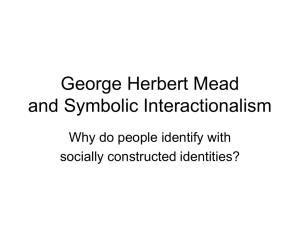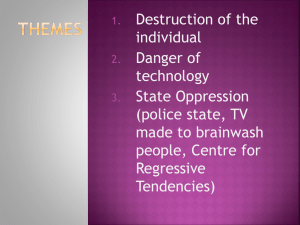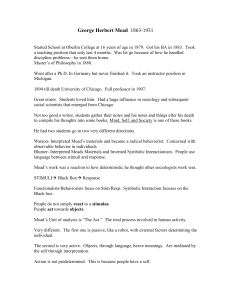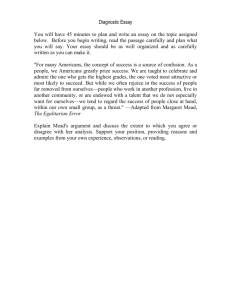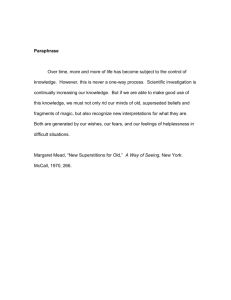qual_research_design - Creative
advertisement
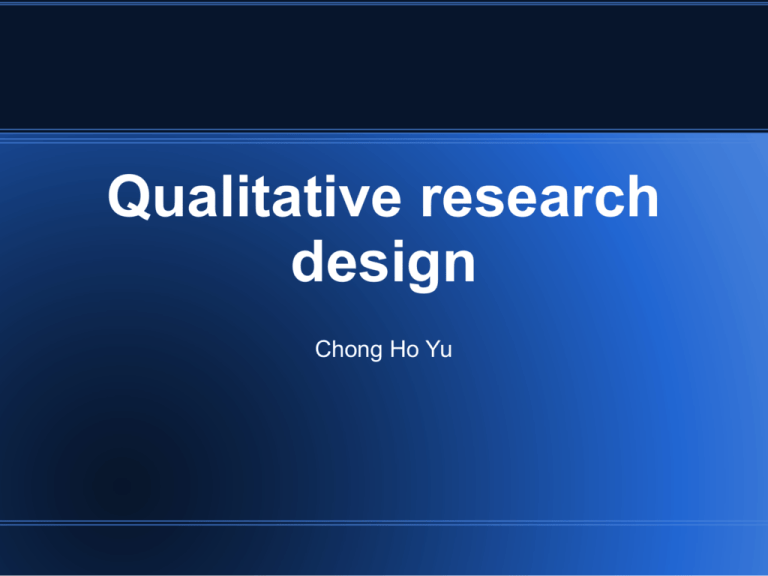
Qualitative research design Chong Ho Yu Differences between qual & quant • Let’s go to the bathroom (not literally) • Let’s look at a bathroom example: • https://www.youtube.com/w atch?v=2X-QSU6-hPU Differences between qual & quant Differences between qual & quant Question: if they mean the same things, why do we need two sets of terminology? Common qualitative methods • Grounded theory • Ethnography • Narrative research • Phenomenological approach Grounded Theory Major ideas Symbolic interactionism: Reality is negotiated between people, always changing, and constantly evolving. Go beyond rich description to explanation. Grounded the theory on data: Put aside preconception and let the concepts emerge from the data “Return” to the ground: Like hypothesis testing; Test the theory by re-interviewing the subjects or interviewing new subjects Interviews (more often) and observations Coding Open coding: identify the categories Axial coding: identify the relationships (like concept map): Discover causal conditions Selective coding: the relationship with the central category Process: (Causal pathway): A B C D Transactional system: A <-> B Constant comparison Category (concept) identification and theory generation should be an iterative process This process will continue until the category is saturated (No additional insight can be uncovered with additional work). In quantitative research the plan is fixed and fidelity of implementation (FOI) is important. In GT planning is not rigid. Different versions of GT Traditional version: Glaser’s version (1978) inherits the intellectual tradition of postpositivism and critical realism, orients toward discovery of objective truths. Researchers should use more well-structured procedures. Evolved version: Strauss and Corbin (1994) explicitly rejected the existence of a pre-existing reality that could be “discovered” (Mills, Bonner, & Francis, 2006a, 2006b). Different versions of GT • Constructivist version: Charmaz (2000, 2002), and Charmaz and Mitchell (2001). • Findings are constructed rather than discovered. • Data are reconstructions of experience and they are not the experience itself • Data as a product of co-construction between the interviewer and the interviewee. Different versions of GT • Constructivist version: • Data are the researcher’s own constructions of other people’s constructions. • The constructivist school accepts participants as co-researchers. What is reality? • Is reality up to our interpretation? • Can reality “evolve” over time? • Take relationship as an example • Honey Moon: “You are one in a million!” Fine print: The divorce rate of the US is 53%. What is reality? 30 years later you may retrospectively re-interpret what had happened. How could I marry such a…? Why was I do blind? References Charmaz, K. (2000). Grounded theory: objectivist and constructionist methods. In N. K. Denzin & Y. S. Lincoln (Eds.), Handbook of qualitative research (pp.509–535). Thousand Oaks, CA: Sage Publications. Charmaz, K. (2002). Qualitative interviewing and grounded theory analysis. In J. F. Gubrium & J. A. Holstein (Eds.), Handbook of interview research: Context and method (pp.675–694). Thousand Oaks, CA: Sage Publications. Charmaz, K. & Mitchell, R. G. (2001). An invitation to grounded theory in ethnography. In P. Atkinson, A. Coffey, S. Delamonte, J. Lofland, & L. H. Lofland (Eds.), Handbook of ethnography (pp.160–174). London: Sage Publications. References Clarke, A. (2005). Situational analysis: Grounded theory after the postmodern turn. London: Sage Glaser, B. G. (1978). Theoretical sensitivity. Mill Valley, CA: Sociology Press. Greckhamera, T., & Mirka, K. L. (2005). The erosion of a method: Examples from grounded theory. International Journal of Qualitative Studies in Education, 18, 729–750. Ethnography What is ethnography? • The researcher immerses himself/herself in a different culture; usually living there for a long period of time. • Different from case studies that focus on individuals; ethnography focuses on the society. • Often used by anthropologists, journalists, and cultural psychologists. Red Star over China • Written by US Journalist Edgar Snow in 1937 • In 1936 Snow spent several months in the Communist-controlled area of China. • Snow portrayed a very positive image of Mao Tse-tung and the Chinese Communist Party (CCP). • Today the validity of the book is questioned. Red Star over China • It played a significant role in changing Americans’ opinion in favor of the Chinese Communist Party. • Many readers got the impression that the Chinese communists were agrarian reformers, not the puppet of the Soviet Union, and thus the US government did not believe that the Chinese communists would side with the USSR. • President Truman stopped supporting the Chinese Nationalist government after World War II. Red Star over China • CCP took over mainland China in 1949 • Between 1949 and 1979 about 80 million Chinese people died of non-natural causes (Anti-right movement, Great Leap Forward, Great Cultural Revolution…etc.) Coming age of Samoa Margaret Mead (1928): Coming age of Samoa Samoan youths were allowed to enjoy sexual adventures. They were less affected by sexual neuroses than their Western peers. Not even a single case of rape was reported, perhaps due to open access to sex. Implications • Mead (1966) proposed a two-step plan for single adults • First step: trial marriage • Second step: determine to withdraw or continue • Cadwallader (1966): cohabiting free couples from feeling trapped for life. • Provide support for sex revolution Criticism Freeman (1983), who is fluent in the Samoan language, challenged Mead’s findings. Mead was unable to speak the native language and thus her account of the Samoan culture relied on interpreters, resulting in many inaccuracies. Freedman traced the source used by Mead and found that either some Samoans didn’t tell the truth or Mead misunderstood their humor. Criticism Margaret Mead and Samoa (1988): https://www.youtube.com/watch?v=Pw1NZjNkAYI https://www.youtube.com/watch?v=4xVZ7W0dlTc https://www.youtube.com/watch?v=3lOlqFVXEKA https://www.youtube.com/watch?v=6Pjumk0Pt_U https://www.youtube.com/watch?v=S8puR-AaSrg https://www.youtube.com/watch?v=KiFqLQ0XcMk Preconception • 1920s debate on nature vs. nurture: scholars argue about whether human conception and behaviors are shaped by fixed human nature or malleable cultural factors. • Mead’s dissertation advisor, Franz Boas, believe in the nurture theory and thus he instructed Mead to find a culture that can prove his position Mangaia of Polynesia Around the age of 13 or 14, boys are given instruction of how to sexually please a girl. Two weeks later the boy has sex with an older, experienced woman in order to fine-tune his skill. Mangaia of Polynesia Girls, also at the age of 13 or 14, are taught by older women on how to get multiple orgasm. Next, girls practiced with men. In this island people have many sexual experiences before marriage Activity Ethnographic studies that support sexual diversity does not end after Freeman’s criticism against Mead. Similar studies are still prevalent (e.g. Mangaia). Form a group of 3-4 people to discuss the following: • How can you evaluate the credibility and implications of these studies? • How can researchers avoid preconception and bias? • Post a short report on Sakai Is it really happening? Is it really happening? Field study Assignment (Quasi-ethnography) • Go to a crowded place (e.g. café, restaurants…etc.). If the setting is situated in a foreign culture (e.g. Korean town, China town), it will be great. If not, it is fine, too. • In each place, spend at least 20 minutes to observe how digital devices, including laptops, Notebooks, Kindles, iPads, smart phones, MP3 players…etc., affect people’s interactions. • After finishing the field observation, post a brief report on Sakai and give a brief verbal report in class Field study Assignment (Quasi-ethnography) • Do people talk to each other or look at their device all the time? • If they talk to each other, how often are they interrupted by phone calls or texting? • Are there any systematic patterns? E.g. Do males ignore their friends more often than females? How about race, age, and other factors? • Warning: Do not let people be aware that you are observing them, otherwise they may change their behaviors. Move your eyes away from them once a while and you have to act “naturally” (e.g. talk to each other in your group) to avoid their suspicion. Narrative research Story telling • Can be conducted in the modes of: • Descriptive • Explanatory • Critical • Very often focus on individuals, not the whole group. • Can gain a deep understanding of how and why things happen to an individual given the context. • Make sure to include relevant information only. Example Doctoral dissertation: The effects of trained moderation in online asynchronous distance learning Example Example Example Example Example Example Example Phenomenology or Phenomenological Approach (PA) Martin Heidegger • Thrown into the world: A person as “embodied”; the person is born into a culture. • The person has only situated freedom, not total freedom Edmund Husserl • Attempt to resolve the conflict between human sciences (e.g. psychology) and the basic sciences (e.g. physics). • Phenomenon: the world of complex experience could not be explained by examining causal relationships, but instead need to be studied AS IS. Edmund Husserl • Experience must be described in a naïve way and cannot studied by statistical methods • Use reduction to assist in exploring the meaning of a person’s experience. • Moustakas expands Husserl’s ideas to transcendental phenomenology. Sören Kierkegaard • Critiques of Hegelian rationalistic philosophy: • • collective in nature: inspired Marxism history has a will and a destiny • Tensions between faith and knowledge: “Leap of faith” • Each individual must know his or her unique relationship with God without following the church or other authorities. Jean-Paul Sartre • Studied under Husserl and familiar with the work of Heidegger. • Existential philosopher: Existence precedes essence • Emphasize individual freedom, individual responsibility and to act meaningful in the world. • Object the Enlightenment ideas that reason and rationality hold the answer to all of human’s problems Lived experience • “lived” suggests everyday experiencing, which is pre-reflective. That means that the phenomenon for the research study must be something that people experience in their everyday lives BEFORE any reflection . • How does a person experience anger at that moment – not when one reflects on the experience afterwards? Phenomenon : conscious experience • Do not focus on actual happenings (who said what in the class or an objective account of the facts) or “experiences” in terms of external objective occurrences. • A topic that appears in the external world but not in a person’s consciousness is NOT an appropriate subject matter for a phenomenological study. Different version of PA • Moustakai: • Member check: The participant is a co-researcher and we need to let the participant check the finding. • Triangulation: we may need another researcher to triangulate (check) the findings. • Gigori: we don’t need objective check or triangulation for subjective experience Epoche • To suspend • to keep steady or hold steady • In a study about religious experience, the researcher may have strong beliefs about what it is like to be spiritual. One of the subjects may say, “God talks to me every day and I know what God’s will is; I will be the chosen one to save the world.” The researcher may think that she is delusional, but he should suspend his judgment. In another study related to religious experience, the interviewee may say, “I was a pastor, but in graduate school after going through rigorous intellectual examinations, I found that Christian faith is illusory. Now I am an atheist and I feel very good. I am intellectually honest.” Again, the interviewer should never pass any judgment. Instead, he or she must listen carefully in order to “enter” his world to understand his lived conversion experience from a Christian to an atheist. Easy to say but hard to do What are the research questions? In-class activity (Epoche) • You are a researcher who employs the phenomenological approach. You want to study the conversion (or de-conversion) experience from Christian faith to atheism, agnosticism, or skepticism. I pretend that I were Ken Daniels, John Loftus, or Dan Barker. When you interview me, try your best to be calm and suspend your judgment, no matter how much you dislike what I say. • Next, pair with a partner and interview each other. The interviewee pretends to be someone that holds a view opposite to the interviewer’s position (e.g. does not believe in climate change, prolife, pro-choice…etc.) or someone has an unusual personality type (e.g. gangster, psycho-killer, terrorist…etc.). Afterwards, post a report to describe your experience.
